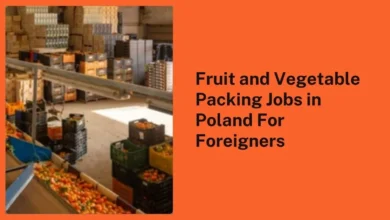Start Your Career In Scotlands Manufacturing Sector 2026

Scotland’s manufacturing industry is growing steadily, creating excellent opportunities for both local and international job seekers to begin or advance their careers. From food processing and electronics to textiles and industrial machinery, the sector offers a wide range of roles for skilled and entry-level workers alike.
Employers are looking for reliable, hardworking individuals to fill positions such as machine operators, production line workers, quality control assistants, and packaging staff.
Many companies offer structured training, career progression, and in some cases, visa sponsorship for foreign applicants. With competitive wages, safe working environments, and access to Scotland’s strong worker protections and benefits, now is the perfect time to start a stable and rewarding career in one of the UK’s most dynamic manufacturing regions.
Key Points:
- Job Title: Scotland Factory jobs
- Job Type: Full Time
- Country: Scotland
- Visa Sponsorship: Yes
Requirements:
Applicants usually want to meet certain standards to qualify for Scotland manufacturing unit visa sponsorship jobs. They may also include
- They have relevant academic qualifications or images in the relevant field.
- Knowledge of the English language (may be required depending on the nature of the task).
- Valid work visa or sponsorship eligibility.
- Adherence to health and safety policies.
- Ability to paint in a group environment.
- Adaptability and willingness to learn new skills.
- Specific needs may also vary depending on the job position and the business enterprise.
Responsibilities:
Duties for factory jobs in Scotland can vary depending on the unique role and industry. However, unusual duties may also include
- Operating machineries and devices in a manner that is both efficient and thorough.
- The assembly, inspection, and packaging of products in compliance with rigorous quality standards.
- Monitoring production techniques to guarantee their efficient operation.
- Conducting routine maintenance and resolving mechanical issues.
- Adherence to health and safety protocols to prevent accidents and incidents.
- Collaborating with crew members to accomplish production goals.
- Maintaining the administrative center’s sanitation and personnel.
- Adherence to the organization’s policies and procedures.
- Directly communicating any issues or concerns to a supervisor.
- Continuous efforts to improve productivity and efficiency.
Also Check: Scotland Factory Vacancies For International Applicants
Salary:
Income for factory visa sponsorship jobs in Scotland can range entirely based on factors including enjoyment, qualification, location, and business. However, the typical annual salary for manufacturing plant workers in Scotland is between £18,000 and £30,000, depending on the role and level of responsibility. Skilled workers or people with specialized know-how could also command better salaries, although entry-level positions may additionally lead to lower starting wages.
Types of Jobs:
- Machine Operator: Responsible for the organization of the workshop, the operation of machinery, and the maintenance of equipment, in addition to ensuring the company’s production efficiency and high-quality output.
- Assembler: This role requires the utilization of manual tools and machinery to assemble parts or products in accordance with specific specifications.
- Inspector of Quality: Performs inspections and testing to ensure that salient products comply with quality standards and established regulations, as well as to identify and rectify any deficiencies or deviations from the prescribed standards.
- Warehouse Associate: Maintains inventory, delivers and receives products, and purifies stock in organized storage areas within the factory.
- Maintenance Technician: Ensures the seamless operation of the system and prevents the waste of work hours by providing routine maintenance, repair, and troubleshooting support to machinery and equipment.
- Production Supervisor: Oversees the daily operations of the factory floor, such as the planning of workflows, the assignment of tasks to employees, and the adherence to safety protocols and timelines.
- Packaging Specialist: A group of manufacturing professionals who are responsible for the assembly and packaging of finished consumer products in accordance with the specified specifications, as well as the labeling of items for shipment or distribution, is known as a packaging specialist.
- Logistics Coordinator: Responsible for the coordination of production logistics, which includes the optimization of logistics efficiency, the planning of cargo, and the implementation of transportation.
- Safety Officer: Promotes a culture of safety among employees and develops and enforces policies and procedures that reduce workplace hazards.
- Engineering Technician: Analyzes defects and endeavors to identify their origins, provides guidance on design and development processes, and assists in the resolution of equipment malfunctions that result in manufacturing complications. Additionally, they provide corrective advice on engineering projects.
How to Apply:
For those who are interested in establishing a career in the manufacturing industry, the Scotland Manufacturing Unit Visa Sponsorship Jobs offer thrilling prospects. Aspiring employees can identify positions that align with their career aspirations, qualifications, and abilities by exploring the diverse range of positions available in distinctive sectors.
Frequently Asked Questions:
-
What types of manufacturing jobs are available in Scotland?
Scotland’s manufacturing sector is diverse spanning traditional industries like whisky, textiles, and food & drink, as well as high-tech fields such as satellites, optics, and life sciences . Key subsectors:
Food & Drink Manufacturing: Scotland’s largest sub-sector around 44,000 employed, with £10.7 billion turnover. Known for Scotch whisky, seafood, and specialty foods .
High-Tech & Engineering: Includes electronics, semiconductors, space (small satellites), chemicals, and pharmaceuticals.
Textiles & Apparel: knitwear, tweed, cashmere still significant employers and exporters -
How strong is the sector, and what skills are most in demand?
Manufacturing makes up about 7–8% of employment in Scotland approximately 200,000+ roles
Productivity in key subsectors like food & drink, chemicals, and pharmaceuticals is notably above UK averages
There is a skills shortage, with many firms struggling to hire qualified staff -
What government support and long‑term prospects exist?
“Making Scotland’s Future”: A government‑led initiative with over £116 million in investment until 2026 for innovation and infrastructure in manufacturing
NMIS (National Manufacturing Institute Scotland): A central hub for advanced manufacturing, particularly in sectors like lightweight materials
The Grangemouth industrial cluster, historically focused on oil refining, is transitioning projected to sustain 850–1,100 jobs by 2040 via green energy and biofuels



